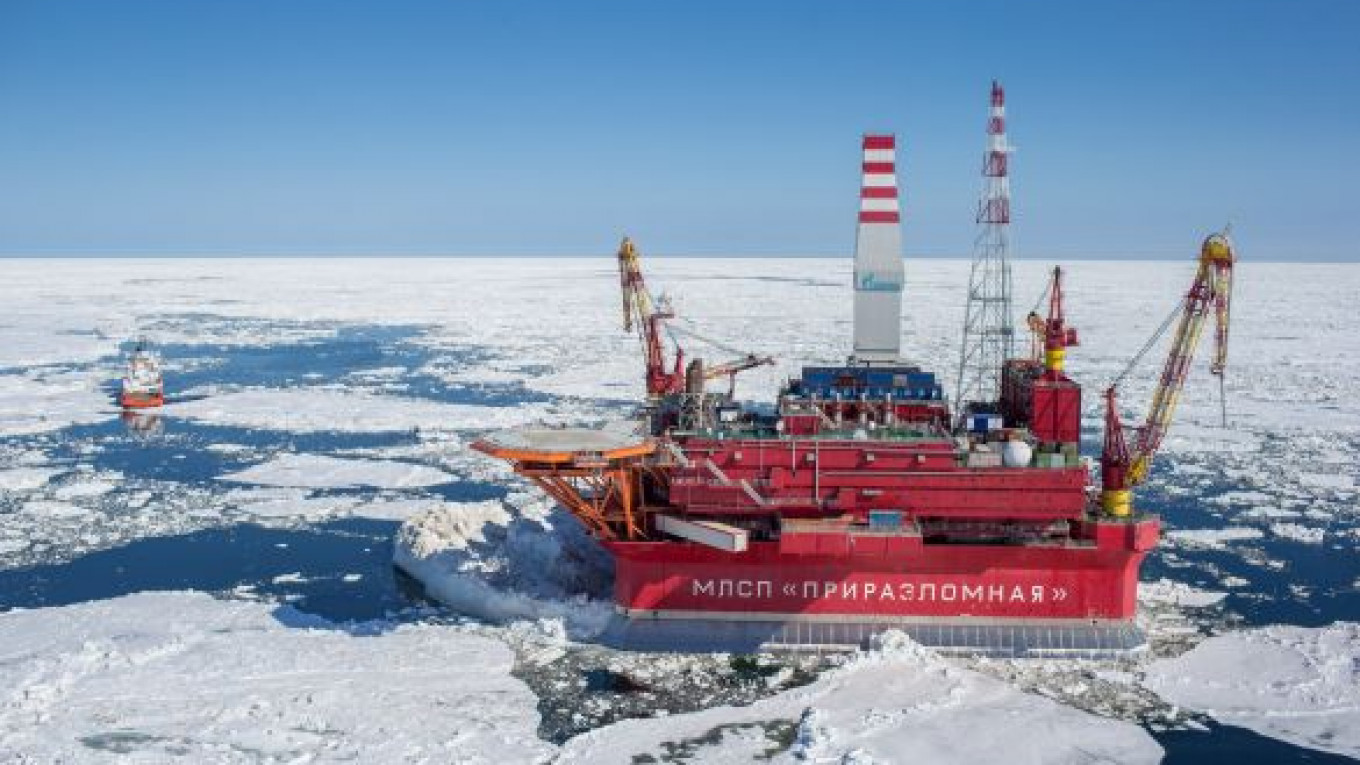Russia's first Arctic offshore field Prirazlomnoye, where Greenpeace activists were arrested in September after a high seas clash with Russian authorities, has started production of oil, energy company Gazprom said Friday.
The project is almost a decade behind its initial schedule and is one of the most controversial energy projects, seen as dangerous for the environment by the Greens, who say that the drilling and storage platform is three decades old.
"We became the pioneers of Russia's Arctic development," Gazprom's chief executive officer Alexei Miller said in a statement.
President Vladimir Putin has said Russia's Arctic offshore riches are of a strategic importance for the country, which now is pumping an average of 10.6 million barrels of oil per day, close to its current capacity.
However, start of production had long been delayed due to various challenges, including aging equipment and a change in shareholders structure. Difficulties obtaining official clearances and technical problems also hampered the project.
Russia, the world's second-biggest oil exporter, is vying with Canada, Denmark, Norway and the U.S. for control of the oil, gas and precious metals that would become more accessible if global warming shrinks the Arctic ice cap.
Greenpeace has said that oil production in the pristine region risks spills similar to the Mexican Gulf disaster at BP's platform in 2010, saying that some of Prirazlomnaya platform's parts were used at another offshore project some 30 years ago.
The activists issued a statement Friday saying the launch of production was "a dark day for the Arctic."
"Gazprom is the first company on Earth to pump oil from beneath icy Arctic waters, and yet its safety record on land is appalling. It is impossible to trust them to drill safely in one of the most fragile and beautiful regions on Earth," Greenpeace said in a statement.
Gazprom has said it has taken all necessary measures to prevent any incidents.
Russia detained 30 Greenpeace activists protesting against Arctic drilling at the Prirazlomnaya platform in September. The protesters faced jail sentences of up to seven years although Putin later announced an amnesty, which covers the activists.
The Arctic region is seen as an important source of potential growth for Russia, the world's largest oil producer, in the next decade, with global oil majors including ExxonMobil, Eni and Statoil clinching deals to enter the Russian Arctic.
Production from these projects is not seen before late 2020s.
Gazprom Neft had expected initial production at Prirazlomnoye at 12,000 barrels per day in 2014 with a plateau of 120,000 bpd in 2021.
Oil will be extracted from the deposit, where winter temperatures often plunge below minus 50 degrees Celsius, and then pumped to tankers bound for Europe.
Gazprom Neft sees overall investments into the project at about 200 billion rubles ($6 billion), of which half had already been spent with the bulk accounting for a special ice-proof platform.
A Message from The Moscow Times:
Dear readers,
We are facing unprecedented challenges. Russia's Prosecutor General's Office has designated The Moscow Times as an "undesirable" organization, criminalizing our work and putting our staff at risk of prosecution. This follows our earlier unjust labeling as a "foreign agent."
These actions are direct attempts to silence independent journalism in Russia. The authorities claim our work "discredits the decisions of the Russian leadership." We see things differently: we strive to provide accurate, unbiased reporting on Russia.
We, the journalists of The Moscow Times, refuse to be silenced. But to continue our work, we need your help.
Your support, no matter how small, makes a world of difference. If you can, please support us monthly starting from just $2. It's quick to set up, and every contribution makes a significant impact.
By supporting The Moscow Times, you're defending open, independent journalism in the face of repression. Thank you for standing with us.
Remind me later.






